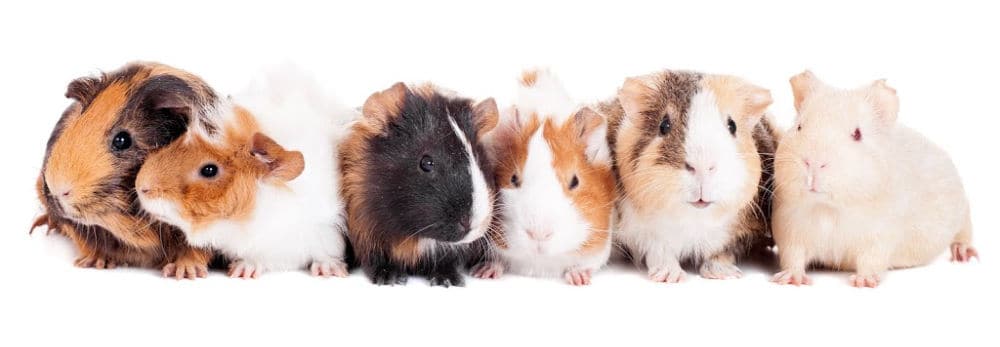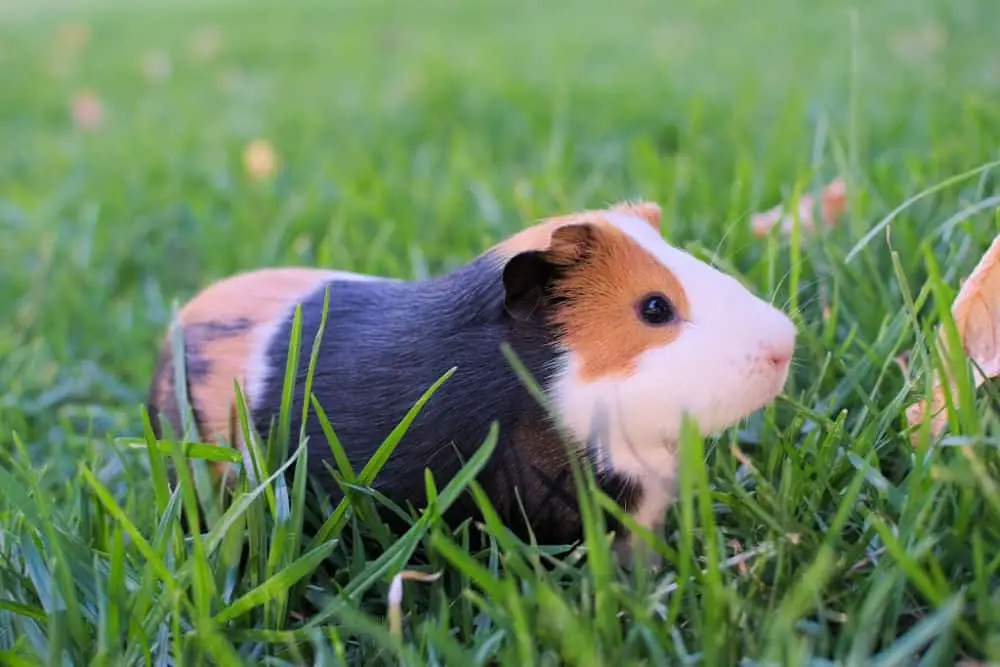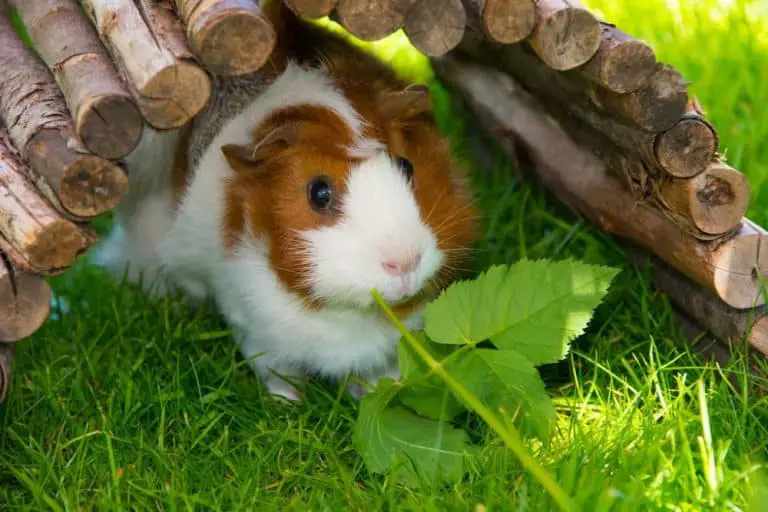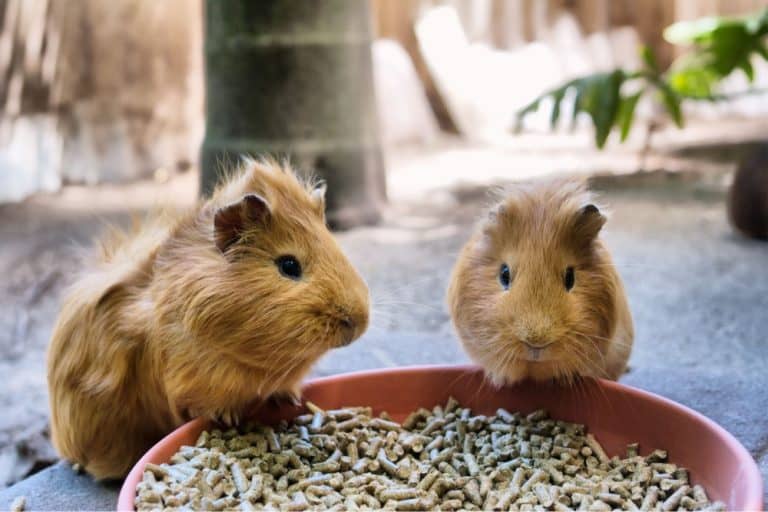Do Guinea Pigs Make Good Pets?
In the small animal pet world, few critters are as talked about as the guinea pig. These adorable creatures have won the hearts of hundreds of thousands of people across the USA. You might have seen these fluffy babies in your local pet shops and wondered if guinea pigs make good pets. Like any pet, that depends on what your ideals and needs are. And that is why we have put together this excellent article. It will tell you the basics of guinea pig needs, the pros, and cons of having them as pets and allowing you to see if they are the right pet for you.
Do Guinea Pigs Make Good Pets?
Yes, Guinea Pigs make great pets! They are social and affectionate and relatively easy to take care of for starters. They are also quite inexpensive to own, their initial cost and monthly cost to feed and care for them, compared to other pets.

Guinea pigs are shy and adoring creatures. These fantastic pets can be a delight for everyone. Guineas are easy to take care of, which is excellent for the first time pet owner. And, since they have such a sweet temperament, they also make great pets for kids. Obviously, children can’t take full responsibility for a pet on their own. But this can be a great learning experience for them and their parents.
Pros Of Owning A Guinea Pig
Before we get too ahead of the game, let’s take a look at all the fantastic qualities of guinea pigs.
- Guinea pigs all have such beautiful personalities. They can each be very different, even from the same litter. They show affection, can learn their names, recognize their owners, and show amusement in games.
- Guineas have a long lifespan of 6-8 years. Longer lifespans are a great advantage because it means more time with your furry friends.
- If you are looking for a small pet who is loving, the guinea pig is right for you. These little animals love to cuddle and relax on the couch with you watching Netflix. Your new guinea might even lick you and jump for joy when they see you.
- For most of us, spending money on expanding our family isn’t a huge deal. But it also doesn’t hurt that guinea pigs are reasonably cheap. Most guinea pigs are less than $30, and you can get a basic set up for just over $200.
- Did we mention that guinea pigs are easy to care for? There are no long walks or potty breaks like dogs. They also don’t need to have a ton of exercise to be happy. As long as they have food, housing, and a clean cage, they are happy.
- Of all the small animals, guineas are the easiest to tame. And that is one of the reasons they make great pets for kids. A word of caution, though, all pets will bite if they are threatened. So never leave your child unattended with pets.
- Some small animals are solitary and don’t take kindly to friends. But that is not the case with guinea pigs. Piggies are herd animals and love to have friends. The more, the merrier with them. And that is how you start collecting cute additions.
- And lastly, there are so many different types of guinea pigs. There are some with long hair, short hair, and many colors. We will talk more about this at the end. But, having a variety of different breeds is always a plus.
Cons Of Owning Guinea Pigs
We wish we could say that there are no cons of owning any pet. But there are always going to be a few traits and needs that make them unfit for some people. This next part will talk about those cons. If none of these are deal-breakers for you, then you are on the road to guinea pig ownership.
- Guinea pigs don’t fit inside small cages. In fact, most guinea pigs that you see in stores are only a few weeks old. These babies will get up to 10 inches long and weigh 2.5 pounds. Because of this larger size, they do need larger cages. In the next section, we will talk about the specific sizes needed.
- While guinea pigs are easy to care for, they do require a lot of cleaning. If you do not clean your guinea pig frequently, you will notice a harsh ammonia smell coming from their cage.
- Guinea pigs are very expressive animals. And unlike a lot of smaller creatures, they let you know. Guinea pigs can be very loud when frightened, playing, or simply talking to each other. These noises will likely keep someone awake if they are in the same room at night.
- And finally, guinea pigs chew everything. Guineas have long front teeth that grow continuously, and they manage this growth with chewing. That means that nothing is safe near the cage, or in free-range areas.
Basic Guinea Pig Care
Now that you have seen the good and bad in guinea pig ownership, it’s time to talk about their basic care. There is, of course, so much to learn and do to make sure that your guinea pig lives a long and happy life. But this section will give you a great starting point.
CAGE – The first thing about owning a guinea, is proper cage set up (this guinea pig cage is a favorite on Amazon). We mentioned before that guinea pigs need a larger space than most small animals. Unfortunately, a lot of pet store cages do not meet these minimum requirements. Ideally, your pen should have at least a 3-inch base pan for bedding, and be 18 inches wide by 3 feet long. If you house two guinea pigs, then your cage will need to be 6 feet long. This will allow you enough room to put a hideout, food, water, and toys without taking away running space.
DIET – Guinea pig’s diet is super simple to balance. Your guinea should get pelleted food and timothy hay at all times. The timothy hay will be your guinea pig’s primary source of nutrition, and they do eat a lot. The next part of their diet is fresh veggies and fruit; this should be given every morning and evening. The other nutritional requirement you need to know about is making sure that your guinea pig is getting a vitamin C supplement daily to maintain their health. Vitamin C is vital because guinea pigs can not synthesize their own vitamin C. Without this, they can get sick quickly, develop brittle bones, and lose energy.
BEDDING – When it comes to bedding, you have a few options. Most people use aspen shavings or paper bedding. These are great for absorbing urine and wicking away odors. Paper and aspen clumps when wet, so it makes for easy spot cleaning. You could even use these as litter in a pan as well. But, some people like to use fleece as an alternative. The fleece will need sweeping daily and switched and washed every three days. Some people like the ease of having a few liner sets and cleaning them all at once when ready. It can save on money and allergies caused by bedding dust.
LITTER – Guineas naturally will designate a spot in their cages to urinate in. You can use this natural instinct to your advantage by placing a litter pan in that corner for easy cleanup. As mentioned above, you can use a simple aspen shaving or paper bedding for this.
EXERCISE – While guinea pigs don’t need time every day outside the cage, it is excellent for them every once in a while. Since guinea pigs can not use a running wheel like a hamster, free-range time can give them time to explore and stretch. To do this, all you need to block off all holes and wires and let your guinea pig run free, or buy a playpen. You could even bring a pen outside for a little added excitement.
Guinea Pig Breeds

Now that you have your set up and basic needs down, you can start thinking about what type of guinea to get. There are so many different breeds of guinea pig, and each one can come in endless color combinations. This can make choosing difficult if you fall in love with them all. Luckily they all can cohabitate peacefully, and most of them have the same temperaments. So you can keep on collecting with no issues.
- American Guinea Pig – These guinea pigs are the most common in all pet stores. They are cheaper than other breeds and are some of the friendliest. American Guineas is also one of the largest guineas that can grow to 3 pounds and 12 inches long.
- Peruvian Guinea Pig – These adorable guineas have such fun, and silly hair do’s. They often have very long waved hair that needs a lot of grooming. You will be the one who has to wash it, brush it, and trim it to keep it clean.
- Teddy Guinea Pig – The Teddy guinea looks like how they sound. They have hair that grows thick and plush straight out, which gives them a squishy look. These cute guineas are famous for their thick fur and sweet faces.
- Abyssinian Guinea Pig – You are sure to recognize this breed from across the room. You will recognize these for their rosettes, or cowlicks, all over their bodies. The Abyssinian will need some grooming to keep them looking good, but it is well worth it.
- Skinny Pigs – These naked piggies resemble a baby hippo, and are some of the strangest of all guineas. They do require special care to keep their skin healthy, and some might even need sweaters when cold. If you decide on these guineas, we recommend doing a lot more research.
What Do You Think?
Has the guinea pig won its way into your heart? Guinea pigs can make fantastic pets for so many reasons. But the only way for you to know them all is to adopt one yourself. Enjoy!
Related Questions
Are Guinea Pigs Nocturnal?
Guinea pigs are incredibly odd little creatures when it comes to their sleeping habits. They don’t seem to be either nocturnal or diurnal (active during the day and rest during the night). Guinea pigs need only four hours of sleep each day and will spend most of the day awake. Guinea pigs will sleep in short intervals during the day and night and might not close their eyes.
Do Guinea Pigs Smell?
Guinea pigs are fastidiously clean little creatures that spend lots of time grooming themselves and stay pretty tidy, but if pet waste builds up in their cage, it’s going to smell. It’s crucial to scrub out the cage and replace bedding once a week. Even with daily scooping, smells can build up if you have not cleaned the entire cage thoroughly.




